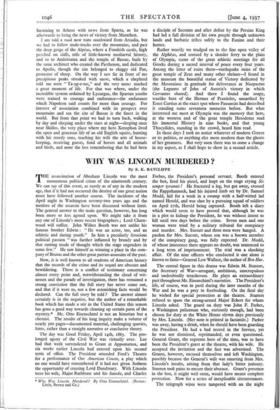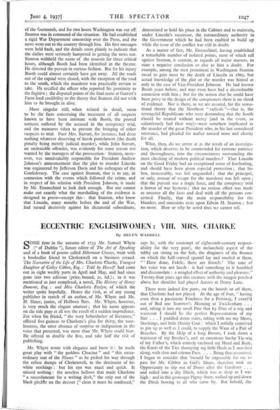WHY WAS LINCOLN MURDERED ?
By S. K. RATCLIFFE
THE assassination of Abraham Lincoln was the most momentous political crime of the nineteenth century. We can say of this event, as surely as of any in the modem age, that if it had not occurred the destiny of one great nation must have followed another course. The incidents of the April night in Washington seventy-two years ago and the motives of the assassin have been discussed without limit. The general answer to the main question, however, has long been more or less agreed upon. We might take it from any one of Lincoln's more recent biographers ; Lord Charn- wood will suffice. John Wilkes Booth was not unlike his famous brother Edwin : " He was an actor, too, and an athletic and daring youth." In him a peculiarly ferocious political passion " was further inflamed by brandy and by that ranting mode of thought which the stage engenders in some few." He saw himself as winning a place in the com- pany of Brutus and the other great patriot-assassins of the past.
Now, it is well known to all students of American history that the records of the crime and its sequel are obscure and bewildering. There is a conflict of testimony concerning almost every point and, notwithstanding the cloud of wit- nesses and the parade of investigation, there has remained a strong conviction that the full story has never come out, and that if it were to, not a few astonishing facts would be declared. Can the full story be told ? The answer almost certainly is in the negative, but the author of a remarkable book which has made a stir in the United States this season has gone a good way towards cleaning up certain parts of the mystery.* Mr. Otto Eisenschiml is not an historian but a chemist. The results of his long inquiry make a volume of nearly soo pages—documented material, challenging queries, hints, rather than a straight narrative or conclusive theory.
The day was Good Friday, April 14th, 1865. The pro- longed agony of the Civil War was virtually over. Lee had that week surrendered to Grant at Appomattox, and six weeks earlier Lincoln had entered upon his second term of office. The President attended Ford's Theatre for a performance of Our American Cousin, a play which no one would have remembered if it had not given Sothem the opportunity of creating Lord Dundreary. With Lincoln were his wife, Major Rathbone and his fiancee, and Charles * Why Was Lincoln Murdered? By Otto Eisenschiml. (Boston : Little, Brown and Co.) Forbes, the President's personal servant. Booth entered the box, fired his pistol, and leapt on the stage crying Sic semper tyrannis ! He fractured a leg, but got away, crossed the Rappahannock, had his injured limb set by Dr. Samuel Mudd, hid for a week in a swamp with a half-witted lad named Herold, and was shot by a pursuing squad of soldiers on April 27th, Herold being captured. Booth left a diary which would seem to have proved that, although he was in a plot to kidnap the President, he was without intent to kill until two days before the crime. Seven men and one woman were tried by a military tribunal for conspiracy and murder. Mrs. Surratt and three men were hanged. A pardon for Mrs. Surratt, whose son was a known member of the conspiracy gang, was fully expected. Dr. Mudd, of whose innocence there appears no doubt, was sentenced to a long term of imprisonment. The trial was a shocking affair. Of the nine officers who conducted it one alone is known to fame—General Lew Wallace, the author of Ben Hur.
The central figure in this drama was Edwin M. Stanton, the Secretary of War—arrogant, ambitious, unscrupulous and undoubtedly treacherous. He plays an extraordinary part throughout Mr. Eisenschiml's narrative. The President's life, of course, was in peril during the later months of the War and he was a prey to foreboding. On the fatal day he wished for special protection at the theatre. Stanton refused to spare the strong-armed Major Eckert for whom Lincoln asked. The guard on duty was John F. Parker, a Washington policeman who, curiously enough, had been chosen for duty at the White House eleven days previously by Mrs. Lincoln. (Her note is printed in facsimile.) Parker was away, having a drink, when he should have been guarding the President. He had a bad record in the Service, yet he was not dismissed, reprimanded, or even questioned. General Grant, the supreme hero of the time, was to have been the President's guest at the theatre, with his wife. He accepted the invitation and the fact was advertised. The Grants, however, excused themselves and left Washington, possibly because the General's wife was smarting from Mrs. Lincoln's insults, arising from that lady's bitter jealousy. Stanton took pains to ensure their absence. Grant's presence in the box, it might well seem, would have meant complete protection. Now for a series of inexplicable circumstances.
The telegraph wires were tampered with on the night of the fourteenth, and for two hours Washington was cut off. Stanton was in command of the situation. He had established a rigid War Department censorship over the Press, and the news went out to the country through him. His first messages were held back, and the details seem plainly to indicate that the dailies were seriously hampered in getting the news out. Stanton withheld the name of the assassin for three critical hours, although Booth had been identified in the theatre. He directed the pursuit in curious fashion. But for his injury Booth could almost certainly have got away. All the roads out of the capital were closed, with the exception of the road to the south, which the murderer was practically certain to take. He recalled the officer who reported his proximity to the fugitive ; the disputed points of the final scene at Garrett's Farm lend credibility to the theory that Stanton did not wish him to be brought in alive.
More singular still, when related in detail, seem to be the facts concerning the treatment of all suspects known to have been intimate with Booth, the proved tortures suffered by the accused in the conspiracy trial, and the measures taken to prevent the bringing of other suspects to trial. Poor Mrs. Surratt, for instance, had done nothing whatever deserving of harsh punishment (the death penalty being merely judicial murder), while John Surratt, an undeniable offender, was evidently for some reason not wanted by the managers of the prosecution. Stanton, more- over, was unmistakably responsible for President Andrew Johnson's announcement that the plot to murder Lincoln was engineered by Jefferson Davis and his colleagues of the Confederacy. The case against Stanton, that is to say, in connexion with the events which followed the crime, and in respect of his relation with President Johnson, is made by Mr. Eisenschiml to look dark enough. But one cannot make out exactly what the marshalling of the evidence is designed to prove—except this : that Stanton, who knew that Lincoln, many months before the end of the War, had turned decisively against his dictatorial subordinate, determined to hold his place in the Cabinet and to maintain, under Lincoln's successor, the extraordinary authority in the Government which he had been enabled to build up while the issue of the conflict was still in doubt.
As a matter of fact, Mr. Eisenschiml, having established a remarkable number of isolated points, most of which tell against Stanton, is content, as regards all major matters, to state a negative conclusion or else to hint a doubt. For example, among the men prominent in Washington Stanton stood to gain most by the death of Lincoln in 1865, but actual knowledge of the plot or the murder was hinted at only in the case of Vice-President Johnson. He had known Booth years before, and may even have had a discreditable connexion with him ; but for the notion that he could have been privy to the design of the conspirators there is no shred of evidence. Nor is there, as we are assured, for the sensa- tional theory that the Northern " radicals "—that is, the revengeful Republicans who were demanding that the South should be treated without mercy (and in the event, so calamitously had their way)—were somehow implicated in the murder of the great President who, in his last considered utterance, had pleaded for malice toward none and charity for all.
What, then, do we arrive at as the result of an investiga- tion, which deserves to be commended for extreme patience and thoroughness, into the circumstances surrounding the most shocking of modern political murders ? That Lincoln on the Good Friday had an exceptional sense of foreboding, and should have been given especial protection ; that his box, inexcusably, was left unguarded ; that the principal, or only, avenue of escape for the murderer was left open ; that the pursuit was a tragic farce, and the conspiracy trial a horror of war hysteria ; that no serious effort was made to uncover all the facts and deal with all the persons con- cerned. Finally, that the main responsibility for the blunders and omissions rests upon Edwin M. Stanton ; but no more. How or why he acted thus we cannot tell.











































 Previous page
Previous page